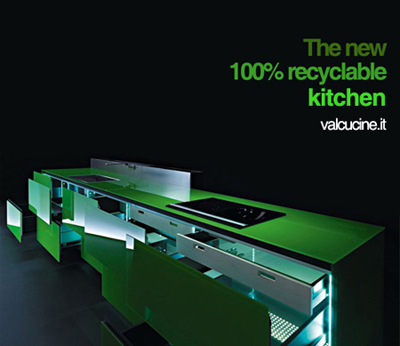Recyclable or recycled?
In answer to the post in Treehugger:
Valcucine's kitchen with Invitrum base units has been designed in the pursuit of eco-sustainability, which does not just mean recyclability or “made from recycled materials”. Rather, it means respecting the four main fundamentals of eco-compatibility.
1) Durability so that the consumption of raw materials and energy required to supply the same item again is postponed to the far future. The Invitrum base units' system is practically indestructible; it does not swell with water and does not become unglued due to heat.
2) The project must be as dematerialised as possible to consume less raw materials and energy. The Invitrum base units' system replaces double side panels that are normally 18+18 mm (total of 36mm) with a single, 10mm glass panel.
3) Reduction of toxic emissions: Invitrum abolishes all uses of glues because it is assembled by means of mechanical joints only; this results in zero emissions of formaldehyde. Moreover, the use of an inert material such as glass cancels any toxic emissions.
4) Make the product as recyclable as possible: this does not mean using only recyclable materials or, better still, recycled and recyclable materials but also that the various materials used are easy to identify and separate; e.g. if two different recyclable materials are glued together it becomes difficult to reutilise them.
The Invitrum base units' system uses only mechanical joints that make the product easy to dismantle, to the extent that we are making arrangements to pick up obsolete kitchens, that we will then recycle, free of charge.
The use of recycled, rather than primary, material is part of Valcucine's research that, for the time being, has been expressed by using secondary aluminium. We are also testing a recycled material for base unit back panels obtained by recycling food packaging (Tetra Pak).
For as much as regards glass, the market does not yet offer recycled glass in sheets. As soon as it will be available, Valcucine will use it to obtain a 100% recyclable product from a 100% recycled product.
Gabriele CentazzoLATEST POSTS









